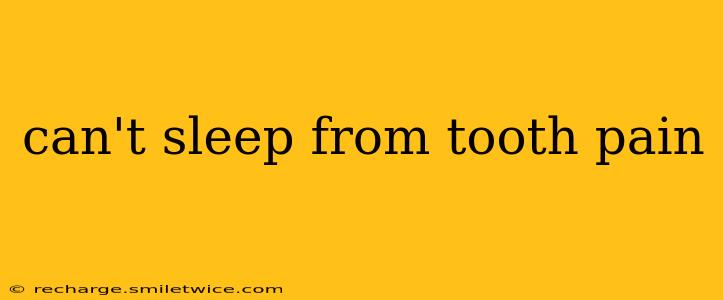Tooth pain that keeps you awake is excruciating. The throbbing, sharp, or dull ache can make even the most comfortable bed feel unbearable. This article explores effective remedies for toothaches that disrupt sleep, when you should seek professional help, and how to prevent future occurrences.
What Causes Tooth Pain That Prevents Sleep?
The causes of tooth pain are varied, and understanding the root cause is crucial for effective treatment. Common culprits include:
- Cavities: Decay weakens tooth enamel, leading to pain, especially when exposed to hot, cold, sweet, or acidic foods and drinks.
- Abscesses: A bacterial infection at the root of the tooth causes intense pain and swelling.
- Gum disease (periodontitis): Inflammation and infection of the gums can lead to significant pain and discomfort.
- Cracked or chipped teeth: These injuries expose the sensitive dentin layer of the tooth, resulting in pain.
- Bruxism (teeth grinding): This often unconscious habit, particularly prevalent during sleep, can wear down enamel and cause significant pain.
- Sinus infection: Pressure from a sinus infection can sometimes be felt as tooth pain, particularly in the upper teeth.
- Wisdom teeth: Impacted or infected wisdom teeth are a common source of severe pain.
Home Remedies for Toothache Pain (Temporary Relief)
While home remedies can provide temporary relief, they are not a replacement for professional dental care. Use these cautiously and always consult a dentist for persistent or severe pain:
- Saltwater rinse: Dissolve ½ to ¾ teaspoon of salt in 8 ounces of warm water. Gently swish the solution around your mouth for 30 seconds, then spit it out. The salt helps to reduce inflammation and kill bacteria.
- Cold compress: Apply a cold compress to your cheek near the affected area for 15-20 minutes at a time. This can help numb the pain and reduce swelling.
- Over-the-counter pain relievers: Ibuprofen or acetaminophen can help manage pain and inflammation. Follow the dosage instructions carefully.
- Clove oil: Clove oil has natural anesthetic properties. Dab a small amount directly on the affected tooth using a cotton swab (use sparingly).
When Should I See a Dentist for Tooth Pain?
Don't delay seeking professional help if you experience:
- Severe or persistent pain: Pain that doesn't respond to home remedies or lasts for more than a day or two warrants immediate attention.
- Swelling: Significant swelling in your face or gums is a sign of infection and requires prompt treatment.
- Fever: A fever accompanied by tooth pain indicates a serious infection.
- Difficulty opening your mouth: This could signify a more serious underlying problem.
- Pus: The presence of pus suggests an abscess, requiring immediate dental attention.
How Can I Prevent Toothaches?
Preventing toothaches involves a commitment to good oral hygiene:
- Brush twice daily: Use a fluoride toothpaste and soft-bristled brush.
- Floss daily: Remove food particles and plaque from between your teeth.
- Regular dental checkups: Visit your dentist for professional cleanings and examinations at least twice a year.
- Healthy diet: Limit sugary and acidic foods and drinks.
- Mouthguard: If you grind your teeth, consider using a mouthguard at night.
What if My Toothache Keeps Me Awake at Night? (Addressing Sleep Disruption)
Tooth pain disrupting sleep can lead to exhaustion and affect your overall well-being. If home remedies aren't effective, consider these sleep strategies:
- Over-the-counter sleep aids: Consult a pharmacist or doctor before using over-the-counter sleep aids, especially if you are taking other medications.
- Relaxation techniques: Try deep breathing exercises, meditation, or progressive muscle relaxation to calm your mind and body.
- Comfortable sleeping position: Experiment with different pillows or sleeping positions to find one that minimizes pressure on your jaw and teeth.
- Seek professional dental care: Addressing the underlying cause of your toothache is the most effective way to ensure a good night's sleep.
Can a Sinus Infection Cause Tooth Pain?
Yes, a sinus infection can sometimes cause referred pain that feels like a toothache, particularly in the upper teeth. The proximity of the sinuses to the upper jaw means pressure and inflammation in the sinuses can be misinterpreted as tooth pain. If you suspect a sinus infection, consult a doctor for diagnosis and treatment.
What are the Best Home Remedies for a Toothache?
While various home remedies offer temporary relief, none replace professional dental care. Saltwater rinses, cold compresses, over-the-counter pain relievers, and clove oil (used sparingly) can provide temporary comfort. However, persistent or severe pain necessitates a visit to the dentist.
This information is for general knowledge and does not constitute medical advice. Always consult a qualified dental professional for diagnosis and treatment of tooth pain.
